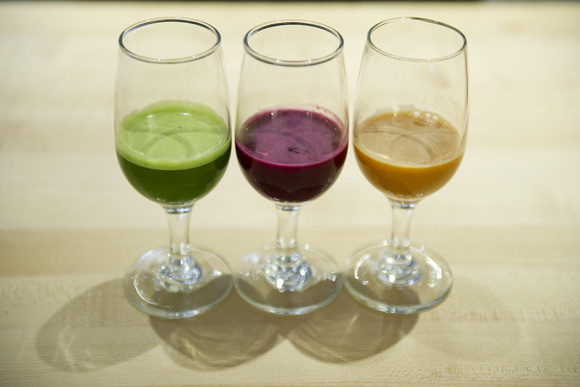Every Tuesday through Saturday morning, Rakhel Yisrael sends a text message to her customers with two lunch entrees for the day, giving them until 11am to place their orders.
She spends the rest of her mornings preparing almost a dozen meals in her home kitchen, using ingredients from local farms and co-operative markets, to distribute throughout the D.C. metro area.
Yisrael has been the owner and sole chef at
Rakhel’s Live Cuisine for over a year now, and has found a successful niche in vegan catering.
“I don’t think there are too many vegan lunch delivery services within the D.C. metro area,” says the 27-year-old entrepreneur.
While Yisrael hopes to one day open a restaurant of her own, she still intends to keep the delivery service as a part of her business, recognizing that many of her customers desire to eat healthy, but may live or work in areas with sparse vegan options.
Moreover, as an African-American woman whose customer base is 99 percent black, Yisrael is feeding longevity into a population of individuals known to live shorter lives due to health issues associated with their eating habits.
In the District, the
death rate of blacks with diabetes is nearly five times that of their white counterparts. Individuals with diabetes are also likely to suffer from diseases like obesity and high blood pressure.
"Our community as African-Americans has been so plagued by diseases and health problems that we�re tired of it."
Yisrael believes that after decades of affliction from such illnesses, African-Americans in the city are connecting the dots to the causes of health-related fatalities facing their people and are finally taking control of their lives.
“Our community as African-Americans has been so plagued by diseases and health problems that we’re tired of it,” says Yisrael. “And in this age and time we’re really getting education on what’s causing these diseases.”
Chef Sonia Adams, founder of
Goshen at Union Market, received her moment of clarity after being introduced to the documentary film Raw For 30 Days, which followed six Americans with diabetes on a thirty-day journey to change their eating habits to reverse the disease.
“That’s how I got started in preparing the food, because we’re at the top of the list for type two diabetes. I felt like I should learn how to make this food so I can offer it to people,” says Adams.
Choices and costs

While the reality of the effects of processed foods are enough for some to change their lifestyles, many individuals choose not to eat clean based on their taste buds. They have become so accustomed to eating from fast-food chains, which produce high-calorie, high-fat meals with ample flavor, that when local establishments come along to offer fresh food, the options might seem too bland.
Addressing this issue, Adams classes up her veggies with popular menu items like carrot and kale cocktails and transforms fruit into desserts like her pumpkin surprise.
“You have to meet people emotionally when it comes to their palates. They just want to eat food that tastes good,” she says of her clientele, who are gradually becoming more African-American since she started at Union Market in November 2012.
Likewise, Khepra Anu understands the importance of preparing tasty food in creating a bridge to healthy eating.
The owner of
Khepra’s Raw Food Juice Bar on H St. NE found that when he began to make more intricate vegan items like pizza, pies and hemp burgers, as opposed to salads, he saw an instant rise in sales.
When he opened shop two years ago, 60 percent of his customers were African-American.
Still, while these chefs use diverse marketing tactics and imaginative ingredients to bring about change in their communities, the cost of going vegan is still a barrier.
Even if the food could potentially save their lives, many people claim they just can’t afford it.
“I’ve had pretty frank conversations about this,” says Adams, who says she challenges individuals who spend their money on clothing and accessories, but claim they can't afford to invest in their health. “You’re always going to pay—either on the front end or the back end.”
Skeptics also must consider the quality of the dishes being served. Comparing her prices to finer restaurants in the city, $10 for a vegan plate is quite reasonable, Yisrael says.
For those who are interested in becoming vegan, but are unable to dine at Khepra’s everyday, Anu suggests researching local farmers markets, potlucks and health food classes in the city to get started.
In all, veganism is not just a dietary decision. It’s a growing lifestyle change for many minorities in the city.
“Becoming vegan has helped me to have a more positive outlook on life by releasing my body of toxins, which has, in turn, released my spirit of toxins—so my spirit has become one that people are more attracted to so I can better help others,” says Yisrael, who intends to someday travel the world spreading consciousness through healthy eating and living.
For now, she will continue to prepare her raw vegan cuisines each morning, making changes in her local community one delivery at a time.